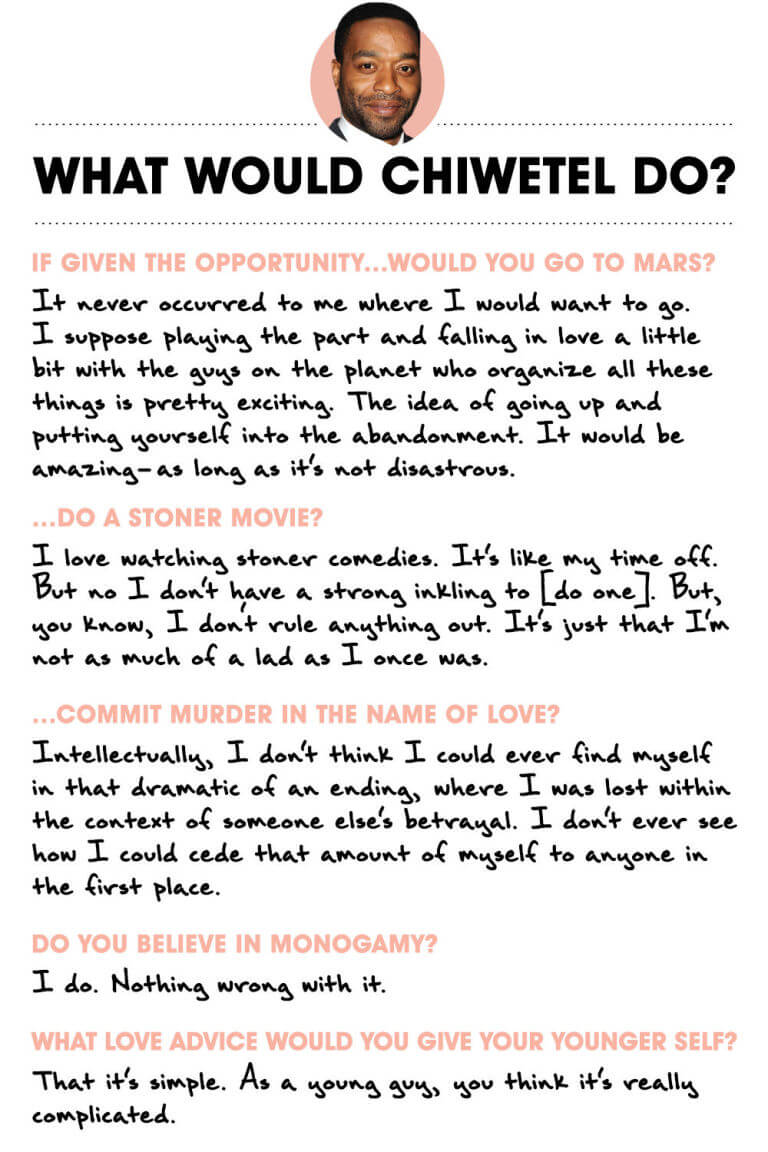
He’s a distinguished actor’s actor who’s no stranger to plumbing the dark depths of the human condition.
It’s the start of the holiday season. But it’s not the nip in the air or the smell of chestnuts roasting on an open fire that reminds Chiwetel Ejiofor that Christmas is coming. It’s the people who come up and start talking to him about Love Actually. As you no doubt recall, Ejiofor plays the newly married Peter, who remains blissfully unaware that his best friend is sick in love with his wife, Keira Knightley. “I watch that movie every year,” people will start telling him come December 1. Or “I had a gospel choir play ‘All You Need Is Love’ at my wedding, too!” Or “I can’t believe she ran out and kissed him while ‘Silent Night’ played softly in the background. That was so wrong. You were right upstairs!”
“Every year,” Ejiofor laughs over the phone from his home in London. People somehow feel comfortable doing this, even though in the past decade Ejiofor has racked up dozens of awards for many other roles—he was notably nominated for an Oscar and a Golden Globe for his performance in 2014’s 12 Years a Slave—and established himself as a serious leading man. A committed London Academy-trained theater geek, he was honored by the Queen of England last summer for his contributions to drama; this year, he’s starring in a full slate of movies with the kind of stars usually kept behind glass: Julia Roberts, Nicole Kidman, Matt Damon. “He is like this Man with a capital M,” says Mackenzie Davis, who was intimidated to find herself cast as a NASA scientist alongside Ejiofor in October’s The Martian. “I was like, This guy is going to be such an actor,” she says. “But then he was so lovely and funny—he had no airs about him at all. He’s completely approachable.”
And it’s not just crazed rom-com fans who think so. Over the summer, Ejiofor recently found himself having some “in-depth chats about life and death” with the people who came to see him at the London’s National Theatre production of Everyman, a fifteenth-century morality play in which a man wrestles with the specter of Death. At the end of the show, Death singles out a random member of the audience for certain demise, and one evening after a performance, the actor found himself in the elevator with that night’s target. “He was really freaked out,” he recalls. “He was saying, you know, it had been a tough kind of year for him, and he hadn’t been well, and now Death had gone and pointed at him in the National Theatre.” He laughed. “We had a chat. I don’t mind. I think it’s kind of nice.”
There’s just something about Ejiofor—maybe it’s his expression, which seems to be permanently open and curious—”this surprised kind of physicality,” Davis muses—that reads “good person.” This undercurrent of empathy helps take the edge off some of the less-than-savory characters he plays, like John Loomis, a scientist in this past summer’s Z for Zachariah who at first inexplicably plays hard to get with Ann (Margot Robbie) on a planet where seemingly all other people have died in a nuclear war, then pivots to commit a terrible act against a lone romantic rival. “I had a lot of sympathy for him,” Ejiofor protests, adding that his character was being cautious by turning down the superhot Robbie’s advances. “I think trying to avoid getting into a bad relationship with essentially the last woman on the planet would be a priority for me.” So does Ejiofor, who recently broke up with his long-term girlfriend, ever get jealous? “Certainly not like that. I mean,” he says, laughing, “shit happens.”
Ejiofor’s empathy for baddies is being put to the test with the new Secret in Their Eyes, a brutal thriller in which he stars as an FBI agent seeking to avenge the murder of the daughter of another agent played by Julia Roberts—and again in the upcoming adaptation of Marvel Comics’ Doctor Strange, in which he plays supervillain Baron Mordo. “To me, a good drama always has an element of something that is unpleasant,” he says. “I find it really exciting and engaging to have characters who are kind of pushed to their limits, to be put into the space of what would one do in a situation, to deal with all of these major questions.” And if you’d like to chat about them: Just ask!

This article originally appears in the December 2015 issue of ELLE.